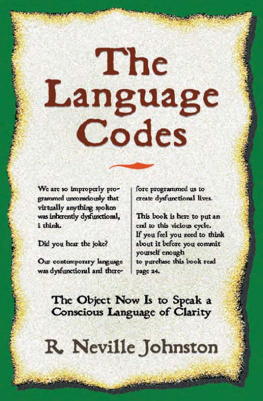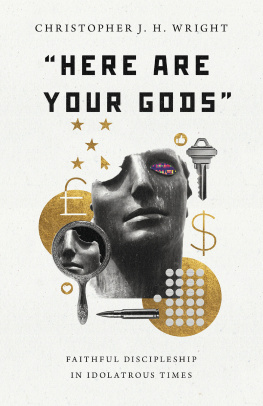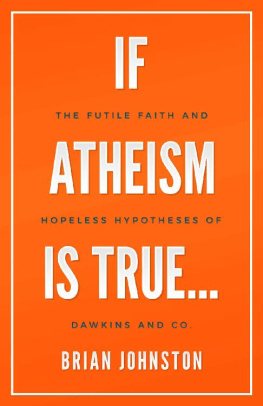SAVING GOD
The image placed here in the print version has been intentionally omitted
Saving God
Religion after Idolatry
MARK JOHNSTON

Copyright 2009 by Princeton University Press
Published by Princeton University Press, 41 William Street,
Princeton, New Jersey 08540
In the United Kingdom: Princeton University Press, 6 Oxford Street,
Woodstock, Oxfordshire OX20 1TW
press.princeton.edu
All Rights Reserved
Second printing, and first paperback printing, 2011
Paperback ISBN 978-0-691-15261-5
THE LIBRARY OF CONGRESS HAS CATALOGED THE CLOTH EDITION
OF THIS BOOK AS FOLLOWS
Johnston, Mark, 1954
Saving God : religion after idolatry / Mark Johnston.
p. cm.
Includes index.
ISBN 978-0-691-14394-1 (hardcover : alk. paper)
1. ReligionPhilosophy. 2. Supernatural. 3. Natural theology.
4. Idolatry. I. Title.
BL51.J75 2009
210dc22 2009012482
British Library Cataloging-in-Publication Data is available
This book has been composed in Minion
Printed on acid-free paper.
Printed in the United States of America
10 9 8 7 6 5 4 3 2
Frontispiece: El ExpolioThe Despoliation of Christ, also known as The
Disrobing of Christ, 15771579. Canvas, 129 160 cm. Cathedral, Toledo,
Spain. Photo by Erich Lessing / Art Resource, NY. Image Reference:
ART213731
For my mum,
MARIE BRIGIT BRENNAN JOHNSTON
Contents
Preface
What follows is an essay, a sustained attempt to get something across, written more or less extempore. It uses the limited range of literary forms the author has at his disposal: quotation, argument, exegesis, midrash, mythic framing, the via analogica, readings against the grain, and the interrogation of the reader. (A poem would do so much better; there your man is Hopkins, and before him Rumi.)
The essay begins, dryly, with a simplified review of the semantics of names; and it gradually evolves into a sort of jeremiad. It contains some philosophy but is not a work of philosophy. My fellow philosophers will all too readily recognize the many places where I have declined the philosophically interesting pathways that branch off from what I say. Still less is it a work in academic theology, and I beg the forbearance of professional theologians as they read what must be, at so many points, glaringly at odds with their creedal commitments and their standard ways of explaining those commitments.
The work is offered simply as the expression of a certain sensibility. I give expression to it, at whatever risk, only because I hope that it has not entirely passed from the world. One kind of ideal reader would be an intelligent young person who is religious, but who feels that his or her genuine religious impulses are being strangled by what he or she is being asked to believe, on less than convincing authority, about the nature of reality. Such a person could begin with the postscript in order to see if what comes before might be in any way helpful, and so be worth the effort.
For those who are looking for a philosophical defense of the spiritual irrelevance of supernaturalism, one place to look is in my Hempel Lectures, entitled Surviving Death. Those lectures take up the crux of supernaturalist belief, namely, the belief in life after death.
SAVING GOD
Chapter 1
Is Your God Really God?
BELIEVING IN GOD
God is God.KARL BARTH
Saving God is saving God from us, from our lazy and self-satisfied conviction that our conventional patterns of belief and worship could themselves capture God. God is transcendent; that is, God can come into view, if he comes into view at all, only as a result of his self-presentation. One consequence of this is the difficulty of knowing whether even as a believer you believe in God.
What is it to believe in God? Believing in God is not to be reduced to believing in the truth of the proposition that God exists. No doubt the Devil, if there were a Devil, would fully accept the proposition that his sworn enemy, God, exists; but nevertheless the Devil is a paradigm case of someone who does not believe in God. Believing in God is standing in a relation of faith and trust to the being who is God. Set aside for a moment the question of belief in the proposition that God exists. Consider instead this question:
Do you believe in God?
It is a question that many people, amazingly, are ready to answer affirmatively just by voicing or inspecting their own inner convictions. Yet relying on a purely subjective basis for answering, Yes, I do believe in God is odd, and perhaps disturbing. For it shows that the one who answers so quickly does not understand the question, and so does not understand just what it is to believe in God.
Suppose you look into your heart and see that there is a god, that is, an object of conventional prayer and worship, which you do believe in. How does that show that you believe in God? No amount of inspecting your own psychological state can itself determine whether you believe in God, as opposed to a god.
Indeed, we shall soon discover that you could believe that there is a God, and believe that your god is God, and believe in your god, but still fail miserably in believing in God. The first three conditions you can determine by looking into your heart; the fourth is, in a certain way, beyond your immediate ken. It requires a certain success in hitting the correct target. Or, more exactly, it requires the arrow of God to have had you, or your religious tradition, as its target.
There is, then, a question as to whether your god is really God. This is an objective question that transcends what is settled by your own psychological state, your introspectible state of belief in and devotion toward any particular god made salient to you by this or that religious tradition.
Here is an induction from past cases which must worry anyone who supposes that he can just announce that he believes in God. There is a confused syncretism that identifies Yahweh with the Holy Trinity (or one member of it) and also with Allah, despite the overwhelming scriptural evidence to the contrary. If we set that confusion aside, then, for the reasons articulated at various points in what lies below, whatever ones monotheistic persuasion might be, one must recognize that many subjectively sincere believers who announce that they believe in God, do not in fact believe in God. For, as the unconfused Christian would say, it is the Holy Trinity, the Triune God, at once Father, Son and Holy Spirit, who is God, and these people believe in Yahweh or Allah. Or, as the unconfused Jew would say (if he could but speak the name Yahweh), it is Yahweh alone who is God, and these people believe in Allah or the Holy Trinity. Or, as the unconfused Muslim would say, it is Allah alone who is God, and these people do not believe in Allah, but in Yahweh or the Holy Trinity.
We may summarize these charges and countercharges like this: These people may be utterly sincere, but their god is not God. When they announce that they believe in God, they are indeed sincere, but they are mistaken. You cannot tell whether you believe in God, as opposed to a god, just by looking into your heart.
The charge echoes back on those who make it: How do you know that your god is God? Clearly, no amount of inspecting your own subjective psychological state, and giving voice to
Next page
















